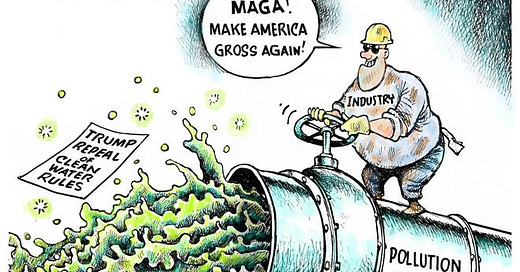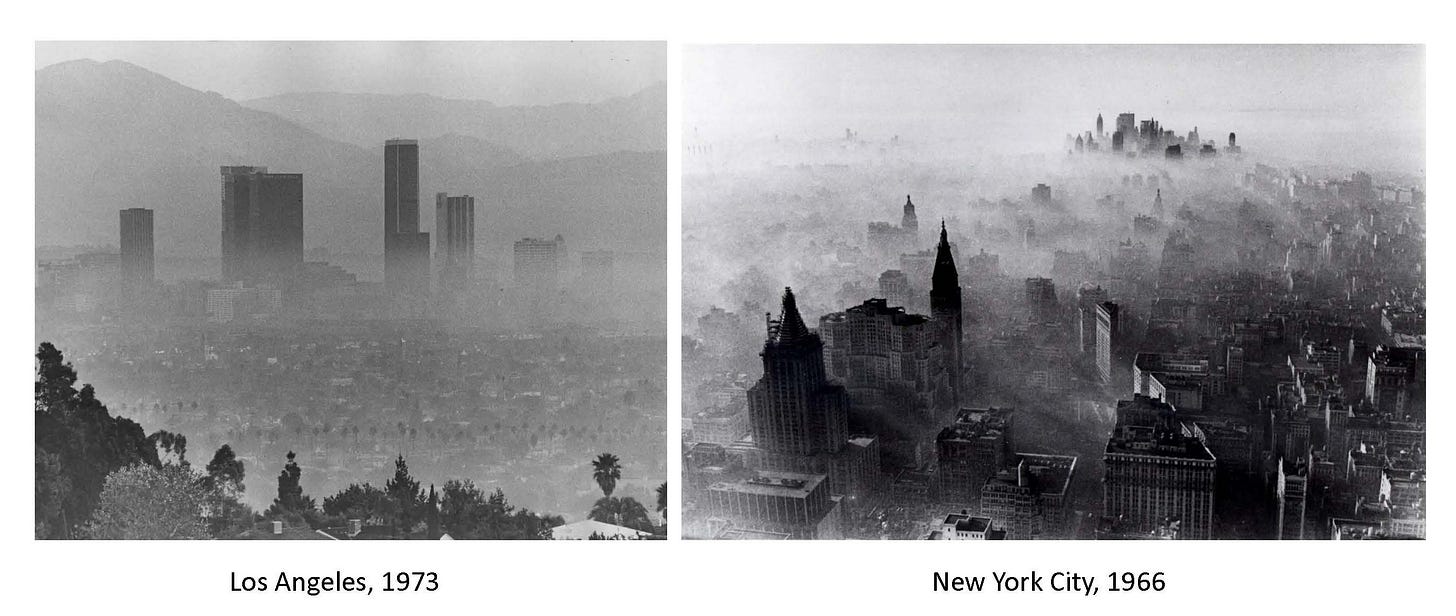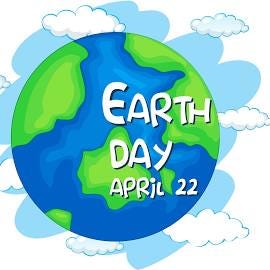“In nature nothing exists alone.” ~Rachel Carson
Lee Zeldin, the head of the U.S. Environmental Protection Agency, was born in 1980. I think that fact is significant, because he was born into a world where there was an EPA, Clean Water Act and Clean Air Act. Maybe if he had been alive in the 1960s, he might understand, why these pieces of legislation were passed and should not be dismantled.
Our cities were filthy with smog.
Rivers were toxic, filled with chemicals and other debris. On June 22, 1969, an oil slick caught fire on the Cuyahoga River just southeast of downtown Cleveland, Ohio. The image that the "the river caught fire" motivated change to protect the environment. However, this was in fact the thirteenth recorded time that the river had caught fire since 1868.
Our highways were littered with trash and ugly billboards.
The explosion of industry and production in post WWII had turned much of our country into a bit of a garbage dump. I, for one, remember what it looked like in the 1960s and 1970s.
As Lee Zeldin works to dismantle the EPA and the regulations that have kept our environment cleaner, I wish he would take some time to understand what the United States looked like before he was born.
Today is Earth Day.
Be a force of nature
Every year on April 22, Earth Day is marked by an estimated one billion people in 192 countries. Whether tree plantings, educational events, or fundraisers, participants work to do their part in keeping our world green and clean. So get ready to clean up your act and celebrate Earth Day in Asheville.
Lend a hand
MountainTrue Earth Day River Cleanup | Tuesday, April 22 | 10 a.m.-2 p.m. | Location TBA | Free, RSVP | Help the French Broad Riverkeeper pick up trash and debris along Asheville’s riparian areas — wear closed-toe shoes, long pants + shirts, and waders if you have them. Bonus: MountainTrue is also hosting a weekend cleanup and plastic audit if you can’t make it on Tuesday.
2025 Explore Asheville Travel & Hospitality Earth Day Cleanup | Tuesday, April 22 | 2-4:30 p.m. | Various Locations | Free, RSVP | Hosted by Explore Asheville, Asheville GreenWorks, RiverLink, and MountainTrue the cleanup will take place throughout the city — check in at your venue for supplies, clean your neighborhood for an hour, then head back for some socializing.
Reducing Plastic Pollution in the Great Lakes
Webinar: May 5, 2025 04:00 PM EST
Thought for the day in honor of his birthday…
“Science is not everything, but science is very beautiful.”
~ J. Robert Oppenheimer
Must Read Article:
It’s hard to find a simpler and clearer statement of the difference between Trump 1.0 and Trump 2.0. The second time around, Trump is doing whatever he wants, whenever he wants, with little regard for the constraints that held him back before. This applies to tariffs and the unleashing of an international trade war—and to many far less consequential personal obsessions of the President. Whether it’s ending globalization or personally dictating the water flow on federal land in the West, unfinished business is the business of Trump’s second term; it’s a do-over Presidency with no precedent in America’s modern history.
The problem with this as a guiding principle for understanding Trump is the sheer volume of scores he wants to settle and battles he wants to refight—an agenda he’s pursuing with manic intensity now that he’s back and unimpeded by Congress or his own pesky aides. It’s as though he has a checklist of all the things that he was stopped from doing before and is running through them in whatever haphazard order they spring to mind: Global tariffs? Check. Take away John Brennan’s security clearance? (Again.) Check. There’s little rhyme or reason to how this is playing out, but I’d suggest a rule to make some sense of the randomness: the more Trump felt frustrated by the refusal to enact one of his disruptive policies or petty diktats last time, the higher the priority he will make of it now—and the more delight he will take in demanding that it be executed.
Quote of the day:
“These passes to pollute carve a ragged hole through the heart of federal protections for the air we breathe. To suggest that it’s a matter of national security to force people from Montana to Alabama to inhale more neurotoxins is offensive. This is what it looks like to put polluter profits ahead of the wellbeing of Americans and the planet.”
~Maya Golden-Krasner
What I’m reading today…
Trump exempts nearly 70 coal plants from Biden-era rule on mercury and other toxic air pollution
The Trump administration has granted nearly 70 coal-fired power plants a two-year exemption from federal requirements to reduce emissions of toxic chemicals such as mercury, arsenic and benzene.
A list quietly posted as of Tuesday on the Environmental Protection Agency’s website lists 47 power providers — which operate at least 66 coal-fired plants — that are receiving exemptions from the Biden-era rules under the Clean Air Act, including a regulation limiting air pollution from mercury and other toxins. The actions follow an executive order last week by President Donald Trump aimed at boosting the struggling coal industry, a reliable but polluting energy source that’s long been in decline.
Trump Opens a Huge Marine Protected Zone to Commercial Fishing
President Trump on Thursday said he was allowing commercial fishing in one of the world’s largest ocean reserves, introducing industrial operations for the first time in more than a decade to a vast area of the Pacific dotted with coral atolls and populated by endangered sea turtles and whales.
Mr. Trump issued an executive order opening up the Pacific Islands Heritage Marine National Monument, which lies some 750 miles west of Hawaii. President George W. Bush established the monument in 2009 and President Barack Obama expanded it in 2014 to its current area of nearly 500,000 square miles.
NC GOP congressman unveils a plan to fix FEMA
This month, the administration asked Edwards to delay rolling out his recommendations and requested more time to review them. Meanwhile, the administration moved forward with cuts to the agency.
Bad Faith and Worse Policy in Trump’s EPA
We need to be watching what this EPA administrator does, not what he says.
As part of Zeldin’s agenda, he has offered nine industrial sectors the opportunity to move their deadlines to reduce their toxic emissions back two years by simply emailing the agency to ask for an extension. It didn’t take long for the American Chemistry Council and the American Fuels and Petrochemical Manufacturers to jointly request an industry-wide exemption from the requirements to reduce carcinogenic and other high-risk pollutants from 200 chemical plants ranging from Texas and Louisiana to the Ohio River Valley and the greater Southeast Region. The operator of the dirtiest coal plant, Colstrip in Montana, has also already submitted an extension request.
Poof! There Goes America’s Competitive Advantage in a Warming World
Allow me to catch you up on how America is faring in the fight against climate change: not well. President Trump is attacking the country’s environmental rules in a way that he never did in his first term. He’s trying not only to repeal rules limiting air and water pollution but also to undo the Environmental Protection Agency’s ability to regulate climate pollution — even whether it can define carbon dioxide as a pollutant.
Perhaps even more important, his volatile trade policy of the past weeks is helping to usher in a new and more paranoid era. This will weaken all of America’s systematic strengths in combating climate change, make us poorer and get us virtually nothing in return…The president’s tariffs have already undermined America’s role in the global order and the free-trade system it helped build. The world can fight and manage climate change only if countries are generally peaceful, rule-following and capable of maintaining positive-sum relationships. Mr. Trump doesn’t seem to believe in these virtues.
Trump’s new energy order puts states’ climate laws in the crosshairs of the Department of Justice
A new executive order from President Donald Trump that’s part of his effort to invigorate energy production raises the possibility that his Department of Justice will go to court against state climate change laws aimed at slashing planet-warming greenhouse gas pollution from fossil fuels.
Trump’s order comes as U.S. electricity demand ramps up to meet the growth of artificial intelligence and cloud computing applications, as well as federal efforts to expand high-tech manufacturing. It also coincides with “climate superfund” legislation gaining traction in various states.
Protecting South Florida’s water hinges on restoring the Everglades. That’s why, 25 years ago, the federal government and universities launched the world’s largest ecosystem restoration effort ever attempted.
Trump administration cancels program to protect Alabamans from raw sewage
In 2021, the DOJ launched an investigation into the Alabama Department of Public Health (ADPH). The 18-month investigation found that the ADPH and the Lowndes County Health Department "engaged in a consistent pattern of inaction and/or neglect concerning the health risks associated with raw sewage" in Lowndes County. About 72% of the county's residents are Black, but "despite ADPH’s awareness of the issues and the disproportionate burden and impact placed on Black residents in Lowndes County, it failed to take meaningful actions to remedy these conditions."
As Trump dismantles EPA, Great Lakes states with a history of pollution likely will suffer
Trump’s latest EPA administrator, former New York Republican congressman Lee Zeldin, is attempting to roll back regulations that have reduced emissions of brain-damaging mercury and lead, lung-damaging soot and cancer-causing chemicals, among other things.
About half of US water ‘too polluted’ for swimming, fishing or drinking, report finds
The Clean Water Act, passed into law 50 years ago, has fallen well short of its goals, a new analysis finds. Nearly half of the rivers and streams across the U.S. are considered too polluted to meet quality standards for swimming, recreation, aquatic life, fish consumption or as drinking water sources.
The Trump administration is working to lift regulations on coal-fired power plants in the hopes of making its energy less expensive. But while cost is one important aspect, utilities have a lot more to consider when they choose their power sources.
Different technologies play different roles in the power system. Some sources, like nuclear energy, are reliable but inflexible. Other sources, like oil, are flexible but expensive and polluting….
The asset management firm Lazard has produced levelized cost of electricity calculations for the major U.S. electricity sources annually for years, and it has tracked a sharp decline in solar power costs in particular.
Coal is one of the more expensive technologies for utilities today, making it less competitive compared with solar, wind and natural gas, by Lazard’s calculations. Only nuclear, offshore wind and “peaker” plants, which are used only during periods of high electricity demand, are more expensive.
Trump signs executive order to boost U.S. coal industry, in part to fuel artificial intelligence
President Donald Trump signed executive orders Tuesday to bolster the country’s declining coal industry, relaxing restrictions on coal mining, leasing and exports in what the White House said was an effort to meet the energy-intensive needs of artificial intelligence data centers.
The executive orders were the latest moves by the Trump administration that clash with global aims to reduce coal power and cut harmful greenhouse gas emissions that fuel climate change.
Environmental legal group plans to fight Trump plan to increase national forest logging
The U.S. Forest Service will soon have to release plans to increase timber production in national forests, including Western North Carolina's wide and expansive Nantahala-Pisgah National Forests and other forests across the south. While a Forest Service administrator described the effort as a "new era" in public land management, legal organizations are already teeing up possible litigation against the plans.
On April 3, U.S. Secretary of Agriculture Brooke Rollins issued a memo establishing an "Emergency Situation Determination" for over 112 million acres of U.S. Forest Service land and ordering the agency to expand the forests' timber production by 25%. The memo also directed the Forest Service to "expediate" work necessary to increase timber production and the removal of some National Environmental Policy Act processes.
Trump orders agencies to ‘sunset’ environmental protections
He ordered agencies including the Environmental Protection Agency (EPA), Energy Department, Nuclear Regulatory Commission, Bureau of Safety and Environmental Enforcement and Fish and Wildlife Service to amend regulations so that they expire by October 2026. The order applies to all regulations issued under laws governing things like energy appliance standards, mining and offshore drilling — as well as regulations issued under the Endangered Species Act.
It’s not yet clear whether the order will also apply to regulations at the EPA under laws like the Clean Air Act, Clean Water Act or Safe Drinking Water Act because the order directs that particular agency to provide the White House with a list of statutes that should be subject to the order.
Team Trump Offers Dire Wolf Excuse to Abandon Endangered Species
The Trump administration wants to forgo endangered species protections—and is hinging its argument on a wild vision of the future straight out of a science fiction novel.
This week, a biotechnology company claimed to have brought back the long-extinct dire wolf using new gene editing technology, and the breakthrough has Secretary of the Interior Doug Burgum thinking outside of the box.
The administration has opened – or reopened – large swaths of government land in Alaska to oil and gas drilling, though only some of those opportunities have drawn much commercial interest in recent years. And an 800-mile pipeline across Alaska that the administration says it supports is not yet funded, and other administration policies risk turning off prospective partners.
President Donald Trump says he wants to grow oil and gas production and advance the goal of what he calls U.S. “energy dominance.” The White House says that term means both reducing the amount of energy imported from other countries and increasing the amount of energy exported from the U.S., especially to allies….Trump went farther, expanding the available land by an additional 6 million acres in the petroleum reserve and another 1.1 million acres of the wildlife refuge.
All those areas are home to many different types of wildlife, as well as Indigenous groups.










